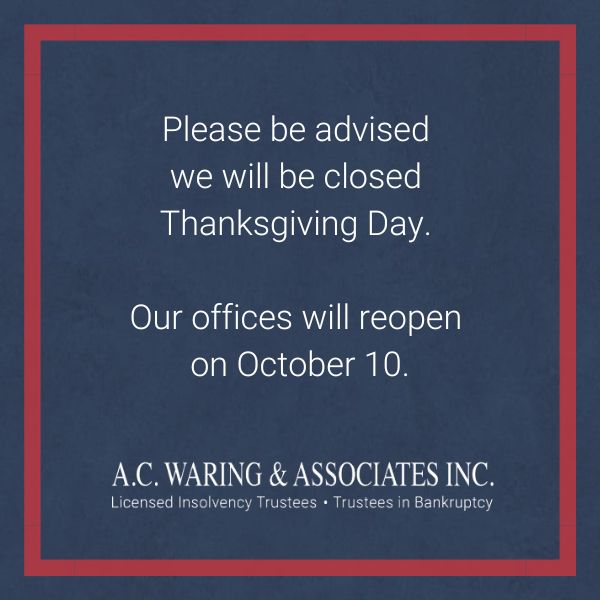During the bankruptcy process, some of your assets may be vested with your Licensed Insolvency Trustee (LIT). Your Trustee will deal with those assets as required.
In Alberta, some assets are exempt from the bankruptcy process. Your Trustee will advise you of these. One item includes up to $40,000 in equity in your primary residence. If you co-own your home, this amount is reduced based on how much of the house you own.
What Happens to Secured Debts During Bankruptcy Proceedings?
Secured debts refer to debts, such as mortgages, that are secured by real estate or car and truck loans that are secured by the vehicle. The filing of a bankruptcy does not extinguish a secured creditor’s right to the collateral. You may choose to continue to pay on your mortgage or vehicle loan so that the secured creditor does not decide to realize on their collateral.
If You Have Negative Equity Or You Do Not Want to Keep the Asset
If you have negative equity in your home (meaning you owe more than the house is currently worth) or you do not want to keep your home, you can choose to stop making payments and let the lender foreclose on the mortgage. Any loss suffered by the mortgage lender will be an unsecured claim in the bankruptcy subject to the type of mortgage. If you do this, the secured debt will become unsecured which means it will be discharged when the bankruptcy process is complete.
If You Have Positive Equity
In Alberta, the first $40,000 of equity you have in your home is exempt (or a portion thereof if you co-own your house). Any positive equity beyond the first $40,000 is considered an asset in your bankruptcy. This means that your Trustee will have to realize on any equity exceeding the exempt amount. This can be accomplished by requiring additional payments into your bankruptcy estate.
For the purpose of bankruptcy, equity refers to whatever money would be left over after any condo fees or property taxes or mortgages are paid. If the home is sold, considerable additional expenses will be incurred. These will have a negative effect on the equity.
Liens
If you aren’t currently up to date on your utility bills and property taxes, for example, then any money you owe the municipal government or the municipal utility company may be added to the tax roll. If you are not able to pay off this money, then the municipal government or utility company may add it to the tax roll which changes the debts you owe them from unsecured to secured. Any liens on your home are counted against the equity you have in your home.
Calculating Equity Example
Let’s look at an example:
If your home is currently valued at $200,000 and you still owe $150,000 on your mortgage this means that you have $50,000 worth of equity in your home. Since only $40,000 in equity is exempt, you will need to pay $10,000 into your bankruptcy estate in order to get your discharge. Failing this, it is possible that the Bankruptcy Court may order that the house be sold.
If you don’t have $10,000, then your Licensed Insolvency Trustee can sell your house to free up that money to pay off some of your debts. However, if a family member or other source is willing to lend you the $10,000, the problem is solved. You will need to continue to make payments on your mortgage to avoid a foreclosure by the mortgage lender.
However, let’s say you also have some unpaid property taxes and are behind on your utility bills. Those debts total $15,000, which comes out of the equity in your home. This means you actually have $35,000 worth of equity. Since the first $40,000 is exempt, your creditors cannot seize your house to help pay off your debts. Under provincial law, any arrears of condo fees or special assessments are also secured ahead of the mortgage lender. If you do not pay your condo fees and assessments it may trigger a foreclosure.
Will I Lose My Home?
Whether or not you lose your home when you file for bankruptcy depends on how much equity you currently have in your home. If you have already paid off a large portion of your mortgage (meaning that you have a lot of equity in your home), it is possible that your home may be sold so that the equity can be used to help settle some of your debts. However, some of the equity in your home is protected under provincial bankruptcy exemption laws.
Understanding Bankruptcy Exemptions
Every province has laws protecting assets from creditors. In Alberta these include:
- Twelve months worth of food
- Clothing items up to $4000
- Household furniture and appliances up to $4000
- One motor vehicle worth up to $5000
- Equity in your primary residence up to $40,000. This is reduced to your share if you are co-owner.
- Tools of your trade worth up to $10,000
- If your main source of income is farming, you may keep up to 160 acres of farmland
- Social allowance, handicap benefits, or a widow’s pension if the benefits are not intermingled with your other funds.
- Any health assistive aids
To estimate the non-exempt equity in your home your Trustee can access the property tax roll to determine the municipal value of your property as well as estimate the outstanding balance of the mortgage and any outstanding charges against the property.
How Should I Proceed?
If your debt issues are compounding and you fear bankruptcy, you should speak with a Licensed Insolvency Trustee. A Trustee can help you assess your financial situation, offer advice, and help you determine if bankruptcy is the right course of action for you. There may be an alternative. You don’t need to weather your financial troubles alone.
Contact A.C.Waring & Associates Inc for advice and assistance.




